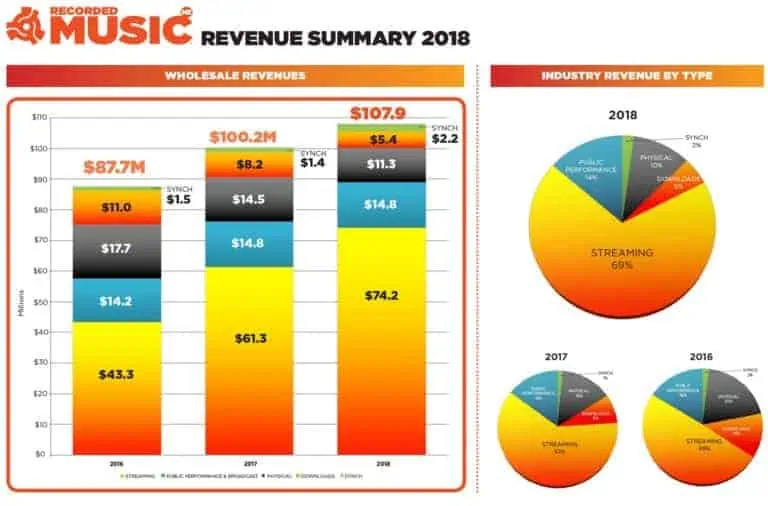
NZ music industry posts 4th year of growth driven by an increase in streaming which now accounts for 69% of revenue in 2018 according to figures released by Recorded Music New Zealand. Revenues increased by 7.7% in 2018 reaching NZ $107.9 million. Services like Spotify and Apple Music have fundamentally changed the way Kiwis access and engage with music.
Recorded Music New Zealand CEO Damian Vaughan said the reduced entry barriers for new artists releasing music and ways in which they can connect with fans has helped the industry grow.
“It’s a very exciting time for New Zealand music, there’s a real optimism and buoyancy in the local industry after four years of growth. Artists are finding new fans and audiences everywhere and there is increased investment going towards developing our local talent.”
Whilst streaming has grown enormously in recent years, digital downloads and physical music remain important contributors, representing 5% and 10% in industry revenue respectively. The resurgence of vinyl has also continued, with vinyl sales now making up 20% of all physical music purchases.
Public Performance and Communication income remained stable in 2018 and newly included in this year’s revenue figures is a small but important revenue stream – synchronisation. A ‘synch’ is when a song is included in an advertisement, television programme, film or video game and in some instances can expose an artist’s music to entirely new audiences.
Damian Vaughan says that to ensure the music industry continues to cultivate viable careers for our artists we need to build on this momentum, support our creatives and ensure that their intellectual property is protected. The New Zealand government is currently undertaking a review of the NZ Copyright Act and Recorded Music NZ is actively engaged with officials in this process alongside our industry colleagues.
“2018 was a very positive year, and our sector is certainly very optimistic about the future and the opportunities ahead. We are looking to government to protect our artists’ rights, ensure rights holders receive fair and equitable treatment, and to create the right conditions to expand our position as exporters on the world stage, while preserving our unique New Zealand identity.”




